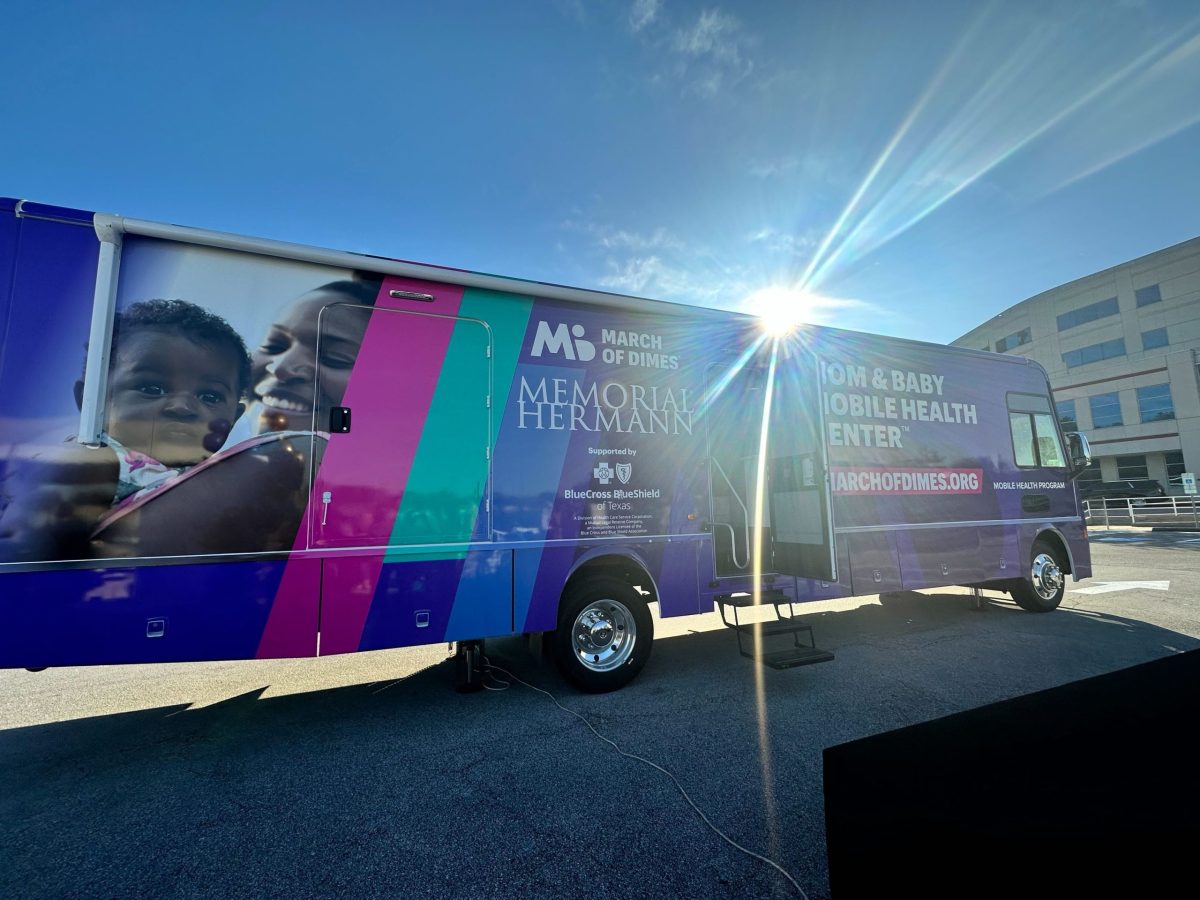Harris County will soon welcome a mobile care facility that will offer maternal health services to underprivileged neighborhoods.
The first Texas Mom & Baby Mobile Health Center, a 30-foot purple recreational vehicle with two clinical rooms, was unveiled Monday by March of Dimes, a nationwide nonprofit organization devoted to enhancing maternal and infant health outcomes. The facility will offer vital health services and education to expectant mothers throughout their pregnancy. In the United States, it will be its sixth unit.
In its first year, the mobile health center will run the same route at different community centers across the county three times a week, with plans to expand to four times a week starting in January. According to Jen Torres, the Houston market senior executive director of market impact at March of Dimes, this will help build trust and have a consistent presence in communities that most need access to services.
Locations for the maternal mobile health center will be chosen using information gathered by the Texas Department of State Health Services that identifies regions with the highest incidence of maternal mortality and preterm, according to Torres, who added the route has not yet been made public.
To get services, patients can walk in or schedule an appointment. It will benefit people in underprivileged areas irrespective of their financial situation, insurance status, or immigration status.
At a ribbon-cutting ceremony held Monday at the Memorial Hermann Southwest Hospital parking lot, Torres stated, “We envision a world where every mom and baby are healthy, regardless of their geography, race, gender, or income, but unfortunately that is just not the case.”
In Harris County, one out of every eight kids is born too young, and that is simply unacceptable.
Harris County s preterm birth rate in 2023 was 12 percent of live births, continuing its trend of outpacing Texas preterm birth rate since 2016, according todata collected by the March of Dimes. Of those babies born premature in Harris County, the rate of preterm birth is highest for Black infants at 16 percent. In the U.S., the preterm birth rate among babies born to Black birthing people is 1.4 times higher than the rate among all other babies, according toMarch of Dimes 2024 report card, which annually analyzes the state of preterm birth, infant mortality, and maternal health in the U.S.
March of Dimes graded Houston an F for preterm birth on its2024 report card,
One of the main driving factors of prematurity in our community is access to care, and this mobile health center will address just that, Torres said.
RELATED:Harris County has had the highest Black maternal death rates in the U.S. for years. Here s why.
By providing pre-conception care to ensure a birthing parent is healthy prior to becoming pregnant, pregnancy, postpartum, and newborn interventions, as well as primary, wellness, and preventive care, the collaborative effort between March of Dimes, Blue Cross and Blue Shield of Texas (BCBSTX), and the Memorial Hermann Health System seeks to expand access to high-quality healthcare.
Blue Cross and Blue Shield of Texas invested a roughly $1.2 million grant for three years, and the Memorial Hermann Health System will provide clinical providers. By finding strategies to lower maternal morbidities, mortality rates, and health disparities, the grant is a component of BCBSTX’s statewide expanded Special Beginnings maternal and infant health initiative, which aims to improve health outcomes for Texas birthing parents and babies in the Dallas/Fort Worth, Houston, Rio Grande Valley, and Austin regions.
This is not a high-tech issue. It s a high-touch issue. It s an access issue, said Jim Springfield, president of Blue Cross Blue Shield Texas at the ribbon cutting. It s (the van) elegant in its simplicity and I m grateful that it ll treat so many people in this city.
Torres said the organization started speaking with Blue Cross Blue Shield Texas roughly two years ago to bring a mobile health center to Harris County because of the widespread need for services.
We have one of the best medical centers in the country, in the world right here at our fingertips, but still there s so many moms and babies that are not getting the care that they need, Torres said.
AMarch of Dimes 2024 maternity care desert reportfound that 20.4 percent of birthing people received no or inadequate prenatal care, greater than the U.S. rate of 14.8 percent.
While Houston is renowned for having one of the largest health care centers in the country, several barriers still exist, including the distance required to travel to access care, a lack of transportation, a lack of trust in the health care system and the need to obtain child care, said Teal Holden, the senior vice president of ambulatory services, post-acute care and community health at Memorial Hermann Health System.
More than 2 million birthing people of childbearing age live in maternity care deserts, areas without access to birthing facilities or maternity care providers, according toMarch of Dimes 2024 maternity care deserts report.
In Texas, 46.5 percent of counties are defined as maternity care deserts compared to 32.6 percent in the U.S. Birthing people living in maternity care deserts traveled 4.5 times farther than women living in areas with full access to maternity care in Texas, traveling on average 8.2 miles and 12.9 minutes to their nearest birthing hospital, the report found. The report also found that roughly 4.6 percent of women in Texas had no birthing hospital within 30 minutes.
Although data for maternity care deserts was collected on the state level, Holden said they re aware that they exist in the southwest community and in parts of Harris County. She s excited to combat many of those barriers through the mobile maternal health care center by simply meeting patients where they are, and also providing wellness and preventative care for the entire family, she said.
Being able to have this mobile health center and go out into our communities, partner with our community partners to bring this type of care to expectant mothers and new mothers within the greater Houston community really helps drive our vision of creating those healthier communities now and for generations to come, she said.
But Holden said she understands that mistrust may still exist with a hospital provider, and said that they also want to make sure that they have a diverse health care team that is reflective of the communities they re serving.
We want to make sure that providers really look like them and are hearing the needs of the community.








